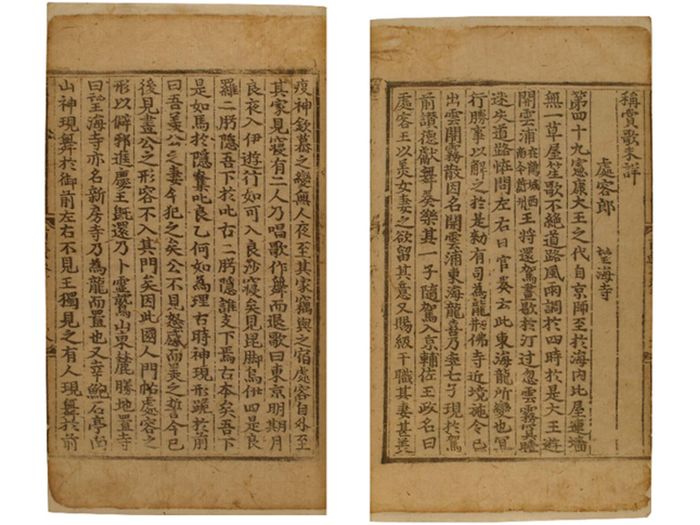"(Translation) 處容郎"의 두 판 사이의 차이
Julian Butterfield (토론 | 기여) (→Student Translation : (Write your name)) |
Julian Butterfield (토론 | 기여) (→Student Translation : (Julian Butterfield)) |
||
| 28번째 줄: | 28번째 줄: | ||
==='''Student Translation : (Julian Butterfield)'''=== | ==='''Student Translation : (Julian Butterfield)'''=== | ||
---- | ---- | ||
| + | . . . The king married him to a beautiful woman, with the intention of making him stay. He also bestowed [upon Ch'ŏyong] the office of Kŭpkan.<ref>I can't find too much information on this position in either Courant or the AKS database. Where else can I look for specifics?</ref> Ch'ŏyong's wife was extraordinarily beautiful, and the god of plague revered and admired her [so much that] he transformed into a person,<ref>Here I'm taking our edition to contain a typo, as we discussed in class, and am translating 變為人 instead of 變無.</ref> and coming to their house at night stole in and slept with her. Ch'ŏyong came home from being out and saw that there were two people lying [there]. Thereupon he sang a song, danced, and retreated. He sang, | ||
| + | |||
| + | ''The Eastern Capital is bright with moonlight,''<br /> | ||
| + | ''When night comes I go wandering,''<br /> | ||
| + | ''Entering the bedchamber I see four legs.''<br /> | ||
| + | ''Two of these belong to me—to whom do the other two?''<br /> | ||
| + | ''[What was] originally mine—how have they been snatched away?''<br /> | ||
| + | |||
| + | At that moment, the god revealed himself, and kneeling before [Ch'ŏyong] said, "I envied Sir of his wife, and now I have violated her—[yet] Sir does not show anger. I am moved and impressed by this. I vow that hereafter, [wherever there is] a picture in Sir's likeness, I will not enter the gate" Thus, people of that country pasted likenesses of Ch'ŏyong on their doors, avoiding evil and advancing the joyous. | ||
*Discussion Questions: | *Discussion Questions: | ||
| − | + | #I had some trouble recalling the relationships made between terms in the song by the Korean particles, so might be pretty far off the mark here. Any recommendations? | |
2018년 7월 16일 (월) 18:41 판
| Primary Source | ||
|---|---|---|
 |
Title | |
| English | ||
| Chinese | ||
| Korean(RR) | ||
| Text Details | ||
| Genre | ||
| Type | ||
| Author(s) | ||
| Year | ||
| Source | ||
| Key Concepts | ||
| Translation Info | ||
| Translator(s) | Participants of 2018 Hanmun Summer Workshop (Intermediate Training Group) | |
| Editor(s) | ||
| Year | 2018 | |
Original Script
Translation
Student Translation : (Julian Butterfield)
. . . The king married him to a beautiful woman, with the intention of making him stay. He also bestowed [upon Ch'ŏyong] the office of Kŭpkan.[1] Ch'ŏyong's wife was extraordinarily beautiful, and the god of plague revered and admired her [so much that] he transformed into a person,[2] and coming to their house at night stole in and slept with her. Ch'ŏyong came home from being out and saw that there were two people lying [there]. Thereupon he sang a song, danced, and retreated. He sang,
The Eastern Capital is bright with moonlight,
When night comes I go wandering,
Entering the bedchamber I see four legs.
Two of these belong to me—to whom do the other two?
[What was] originally mine—how have they been snatched away?
At that moment, the god revealed himself, and kneeling before [Ch'ŏyong] said, "I envied Sir of his wife, and now I have violated her—[yet] Sir does not show anger. I am moved and impressed by this. I vow that hereafter, [wherever there is] a picture in Sir's likeness, I will not enter the gate" Thus, people of that country pasted likenesses of Ch'ŏyong on their doors, avoiding evil and advancing the joyous.
- Discussion Questions:
- I had some trouble recalling the relationships made between terms in the song by the Korean particles, so might be pretty far off the mark here. Any recommendations?